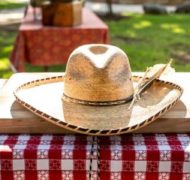Dressing Up Like God
Daily Reflection / Produced by The High Calling
You were taught, with regard to your former way of life, to put off your old self, which is being corrupted by its deceitful desires; to be made new in the attitude of your minds; and to put on the new self, created to be like God in true righteousness and holiness.
Ephesians 4:22
Children love to dress up in their parents' clothing. I can still remember when I was a young boy, walking around wearing my dad's giant shoes and humongous coat. When I put on his clothes, I felt like I was my dad. Perhaps I even acted like my dad without even knowing it.
Recent psychological research suggests that when we wear clothing with particular meaning, it affects our behavior. In an article in the Journal of Experimental Social Psychology, researchers from Northwestern University make a case for what they call "Enclothed cognition." Adam D. Galinsky and Hajo Adam ran a series of experiments in which people put on a distinctive, meaning-laden garment, like a doctor's coat. When wearing this coat, subjects did better in cognitive exercises than when they did not wear the coat. It wasn't enough just to see the doctor's coat and be inspired by it, or to put on any old white coat. Improvement in the tests came when subjects knew they were wearing a doctor's coat and could actually feel it on their bodies. Thus the title, "Enclothed cognition." We are aware of, act differently in light of, and even perform better depending on the clothing we wear.
So what if we were to dress up like God? No, I'm not envisioning wearing a robe and a beard like God in the Sistine Chapel or putting on a Norse warrior costume and winged-helmet like Thor. Rather, I'm thinking in light of Ephesians 4:24: "[You were taught] to put on the new self, created to be like God in true righteousness and holiness." Notice that the new self we "put on" as if it were an article of clothing is "created to be like God." This doesn't mean, of course, that we become all-knowing and all-powerful. We are like God when it comes to "true righteousness and holiness."
Righteousness, in this verse, is living in right-relationships in every sector of life. The Greek word translated here as "righteousness" can also mean "justice" when applied to legal or social contexts. Thus, even as God treats all people rightly and seeks to be in a right relationship with them, even as God executes justice for all, so we are to do the same.
The word translated in Ephesians 4:24 as "holiness" isn't the common New Testament word for holiness, which means "set apart for something special." Rather, the term in this verse, hosiotes, means "devoutness" or "piety." It has to do with honoring God in religious duties as well as in all of life. Thus, we might say that we are to put on our new self, which has been created by God so that we might be just like God in everything we do: in our work and our worship, in our relationships and our religion.
Notice that putting on the new self has to do with actual behavior, not just with inner beliefs and feelings. Even as Galinsky and Adam found that one has to feel the doctor's coat in order to act like a doctor, so we need to feel our godlikeness through doing actions that reflect God's own actions. This thought is similar to what we read in Ephesians 2:10, where God "created [us] in Christ Jesus to do good works." As we put on our new self, engaging in behaviors in imitation of God, choosing to do and speak like Jesus, then we will experience our newness in Christ. Moreover, if "enclothed cognition" is correct, actually finding ourselves acting more consistently like God than we might ever have imagined.
QUESTIONS FOR FURTHER REFLECTION: Did you ever play "dress up" when you were a child? What was this like? How might your life be different if you were to "dress up" like God? If you were to imagine yourself as representing God in every part of life, how might this affect your behavior, relationships, values, and words?
PRAYER: Heavenly Father, even as I once dressed up like my dad, so may I dress up in your clothes, so to speak. Help me to put on the new self you have created for me, so that I might act like you, speak like you, love like you, and be like you. Today, no matter where I am or what I am doing, may I be a true Christian, a "Christ-like" person. To you be all the glory. Amen.
_______________________________________
Mark Roberts is the Executive Director of Digital Media and the Theological and Cultural Steward for Foundations for Laity Renewal. He is the author of eight books, including No Holds Barred: Wrestling with God in Prayer. He lives in Boerne, Texas, with his wife, Linda. Their children spend most of the year away at college on the East Coast.
Creating Beauty at Work
Are you feeling a little lackluster about your work environment? Then our series Creating Beauty at Work is for you. While brightly painted walls or sleek, modern furniture might lighten our mood and inspire creativity, investing in the people we work with, helping them to bring the best of who they are and caring about them even when they can’t, is at the heart of a beautiful workplace. Before you buy a new framed print for the wall, try complimenting your cubicle mate or saying thank you to the janitor. Or if you or someone you know needs encouragement along these lines, then start a conversation with a coworker or friend by joining us on The High Calling.
Image courtesy of Laity Lodge, one of our sister programs in the Foundations for Laity Renewal.






